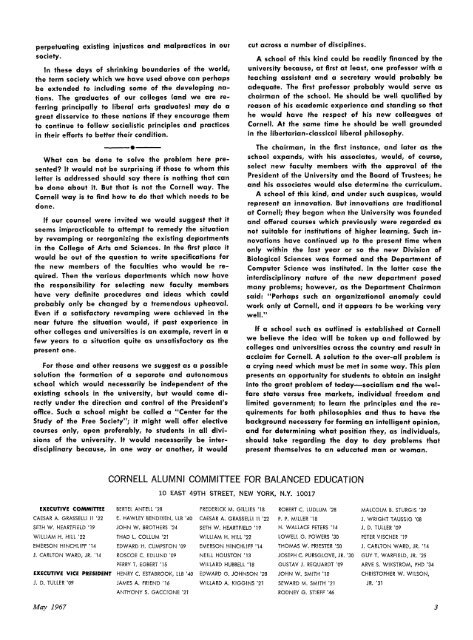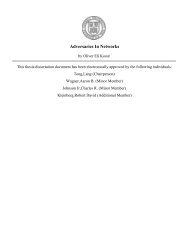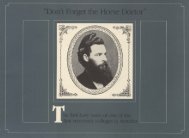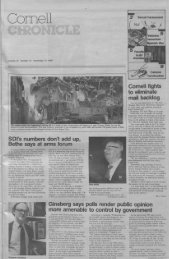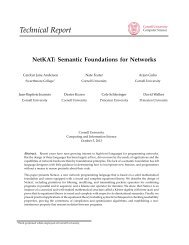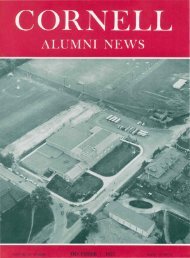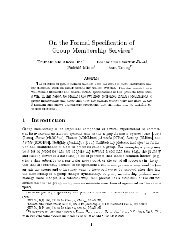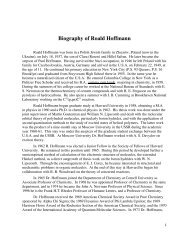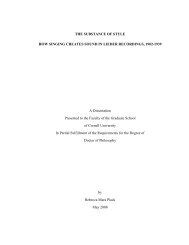Cornell Alumni News - eCommons@Cornell - Cornell University
Cornell Alumni News - eCommons@Cornell - Cornell University
Cornell Alumni News - eCommons@Cornell - Cornell University
You also want an ePaper? Increase the reach of your titles
YUMPU automatically turns print PDFs into web optimized ePapers that Google loves.
perpetuating existing injustices and malpractices in our<br />
society.<br />
In these days of shrinking boundaries of the world,<br />
the term society which we have used above can perhaps<br />
be extended to including some of the developing nations.<br />
The graduates of our colleges (and we are referring<br />
principally to liberal arts graduates) may do a<br />
great disservice to these nations if they encourage them<br />
to continue to follow socialistic principles and practices<br />
in their efforts to better their condition.<br />
What can be done to solve the problem here presented?<br />
It would not be surprising if those to whom this<br />
letter is addressed should say there is nothing that can<br />
be done about it. But that is not the <strong>Cornell</strong> way. The<br />
<strong>Cornell</strong> way is to find how to do that which needs to be<br />
done.<br />
If our counsel were invited we would suggest that it<br />
seems impracticable to attempt to remedy the situation<br />
by revamping or reorganizing the existing departments<br />
in the College of Arts and Sciences. In the first place it<br />
would be out of the question to write specifications for<br />
the new members of the faculties who would be required.<br />
Then the various departments which now have<br />
the responsibility for selecting new faculty members<br />
have very definite procedures and ideas which could<br />
probably only be changed by a tremendous upheaval.<br />
Even if a satisfactory revamping were achieved in the<br />
near future the situation would, if past experience in<br />
other colleges and universities is an example, revert in a<br />
few years to a situation quite as unsatisfactory as the<br />
present one.<br />
For those and other reasons we suggest as a possible<br />
solution the formation of a separate and autonomous<br />
school which would necessarily be independent of the<br />
existing schools in the university, but would come directly<br />
under the direction and control of the President's<br />
office. Such a school might be called a "Center for the<br />
Study of the Free Society"; it might well offer elective<br />
courses only, open preferably, to students in all divisions<br />
of the university. It would necessarily be interdisciplinary<br />
because, in one way or another, it would<br />
cut across a number of disciplines.<br />
A school of this kind could be readily financed by the<br />
university because, at first at least, one professor with a<br />
teaching assistant and a secretary would probably be<br />
adequate. The first professor probably would serve as<br />
chairman of the school. He should be well qualified by<br />
reason of his academic experience and standing so that<br />
he would have the respect of his new colleagues at<br />
<strong>Cornell</strong>. At the same time he should be well grounded<br />
in the libertarian-classical liberal philosophy.<br />
The chairman, in the first instance, and later as the<br />
school expands, with his associates, would, of course,<br />
select new faculty members with the approval of the<br />
President of the <strong>University</strong> and the Board of Trustees; he<br />
and his associates would also determine the curriculum.<br />
A school of this kind, and under such auspices, would<br />
represent an innovation. But innovations are traditional<br />
at <strong>Cornell</strong>; they began when the <strong>University</strong> was founded<br />
and offered courses which previously were regarded as<br />
not suitable for institutions of higher learning. Such innovations<br />
have continued up to the present time when<br />
only within the last year or so the new Division of<br />
Biological Sciences was formed and the Department of<br />
Computer Science was instituted. In the latter case the<br />
interdisciplinary nature of the new department posed<br />
many problems; however, as the Department Chairman<br />
said: "Perhaps such an organizational anomaly could<br />
work only at <strong>Cornell</strong>, and it appears to be working very<br />
well."<br />
If a school such as outlined is established at <strong>Cornell</strong><br />
we believe the idea will be taken up and followed by<br />
colleges and universities across the country and result in<br />
acclaim for <strong>Cornell</strong>. A solution to the over-all problem is<br />
a crying need which must be met in some way. This plan<br />
presents an opportunity for students to obtain an insight<br />
into the great problem of today—socialism and the welfare<br />
state versus free markets, individual freedom and<br />
limited government; to learn the principles and the requirements<br />
for both philosophies and thus to have the<br />
background necessary for forming an intelligent opinion,<br />
and for determining what position they, as individuals,<br />
should take regarding the day to day problems that<br />
present themselves to an educated man or woman.<br />
CORNELL ALUMNI COMMITTEE FOR BALANCED EDUCATION<br />
10 EAST 49TH STREET, NEW YORK, N.Y. 10017<br />
EXECUTIVE COMMITTEE BERTEL ANTELL '28<br />
FREDERICK M. GILLIES Ί8<br />
ROBERT C. LUDLUM '28<br />
MALCOLM B. STURGIS '39<br />
CAESAR A. GRASSELL! II '22 E. HAWLEY BENDIXEN, LLB '40<br />
CAESAR A. GRASSELLI II '22<br />
P. P. MILLER Ί8<br />
J. WRIGHT TAUSSIG '08<br />
SETH W. HEARTFIELD Ί9<br />
JOHN W. BROTHERS '24<br />
SETH W. HEARTFIELD Ί9<br />
H. WALLACE PETERS Ί4<br />
J. D. TULLER '09<br />
WILLIAM H. HILL '22<br />
THAD L. COLLUM '21<br />
WILLIAM H. HILL f 22<br />
LOWELL G. POWERS '30<br />
PETER VISCHER '19<br />
EMERSON HINCHLIFF "14 EDWARD H. CUMPSTON Ό9<br />
EMERSON HINCHLIFF Ί4<br />
THOMAS W. PRIESTER '50<br />
J. CARLTON WARD, JR. Ί4<br />
J. CARLTON WARD, JR. Ί4 ROSCOE C. EDLUND Ό9<br />
NEILL HOUSTON '13<br />
JOSEPH C. PURSGLOVE, JR. '30<br />
GUY T. WARFIELD, JR. '25<br />
PERRY T. EGBERT '15<br />
WILLARD HUBBELL Ί8<br />
GUSTAV J. REQUARDT Ό9<br />
ARVE S. WIKSTROM, PHD '34<br />
EXECUTIVE VICE PRESIDENT HENRY C. ESTABROOK, LLB '40<br />
EDWARD G. JOHNSON '28<br />
JOHN W. SMITH Ί0<br />
CHRISTOPHER W. WILSON,<br />
J. D. TULLER '09 JAMES A. FRIEND Ί6<br />
WILLARD A. KIGGINS '21<br />
SEWARD M. SMITH '21<br />
JR. '31<br />
ANTHONY S. GACCIONE '21<br />
RODNEY G. STIEFF '46<br />
May 1967


